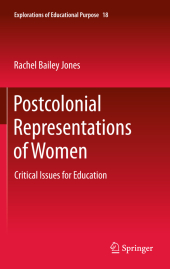 Neuerscheinungen 2013Stand: 2020-01-07 |
Schnellsuche
ISBN/Stichwort/Autor
|
Herderstraße 10
10625 Berlin
Tel.: 030 315 714 16
Fax 030 315 714 14
info@buchspektrum.de |

Rachel Bailey Jones
Postcolonial Representations of Women
Critical Issues for Education
Repr. d. Ausg. v. 2011. 2013. viii, 236 S. VIII, 236 p. 235 mm
Verlag/Jahr: SPRINGER NETHERLANDS; SPRINGER, BERLIN 2013
ISBN: 9400736525 (9400736525)
Neue ISBN: 978-9400736528 (9789400736528)
Preis und Lieferzeit: Bitte klicken
This combination of post-colonial theory, feminism and pedagogy analyzes the way colonial powers have represented native women in education, and advocates the use of subversive feminist representations of women that recast our understanding of ´difference´.
In this accessible combination of post-colonial theory, feminism and pedagogy, the author advocates using subversive and contemporary artistic representations of women to remodel traditional stereotypes in education. It is in this key sector that values and norms are molded and prejudice kept at bay, yet the legacy of colonialism continues to pervade official education received in classrooms as well as ´unofficial´ education ingested via popular culture and the media. The result is a variety of distorted images of women and gender in which women appear as two-dimensional stereotypes.
The text analyzes both current and historical colonial representations of women in a pedagogical context. In doing so, it seeks to recast our conception of what ´difference´ is, challenging historical, patriarchal gender relations with their stereotypical representations that continue to marginalize minority populations in the first world and billions of women elsewhere. These distorted images, the book argues, can be subverted using the semiology provided by postcolonialism and transnational feminism and the work of contemporary artists who rethink and recontextualize the visual codes of colonialism. These resistive images, created by women who challenge and subvert patriarchal modes of representation, can be used to create educational environments that provide an alternative view of women of non-western origin.
Introduction.- Development of Feminist Postcolonial Theory.-Histories of Dominance, Colonialism, and Globalization.- Distorted Visions: Ethnocentric Forms of Education.- History of the Visual Regime.- The Gendered Subject/Object in Popular Culture.- Case study: the veiled women in the visual imagination of the west.- Possibilities for subverting the dominant visual regime.- Creating Postcolonial Visual Pedagogy.- References.


